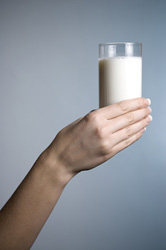Probiotics: What are They and Are You Getting Enough?
by www.SixWise.com
Probiotics, which means “for life,’ are beneficial bacteria that can assist your body with digestion and help protect you from harmful bacteria.
|

Probiotics help keep the bad bacteria in your gut in check, assisting in healthy digestion and much more.
|
There are, in fact, trillions of bacteria in your digestive tract, but not all of them are good for you. One reason why probiotics are so important is because they help keep the balance of good vs. bad bacteria in check. Without them, bad bacteria would overwhelm your system, causing your cells to miss out on important nutrients and function poorly.
As written in the book Digestive Wellness, probiotics lower the pH of your colon and kill disease-causing microbes. They also produce vitamins A, B and K, protect you from illness, enhance peristalsis, and make lactase for milk digestion. Probiotics also ferment dietary fiber, producing short-chained fatty acids, one of which, called butyric acid, having low levels has been associated with ulcerative colitis, colon cancer, active colitis and inflammatory bowel disease.
Because of their promising benefits, probiotics have been the topic of much recent research (and have spurred a host of new food products like Dannon's Activia). Already, its been found that probiotics may:
- Enhance your immune system (70 percent of your immune system is located in your digestive system, which means that if your gut is overrun with bad bacteria, there’s a good chance your immune system will not be functioning at its best)
- Prevent infections after surgery
- Treat acute and chronic diarrhea
- Relieve inflammatory bowel disease
- Treat irritable bowel syndrome (IBS)
- Protect against cancer development and progression
- Prevent eczema in children
- Prevent and treat vaginal yeast infections and urinary tract infections
- Help reduce weight gain and maintain ideal body weight
- Help reduce systemic allergic responses
Why are Some People Lacking in Good Bacteria?
When we are born, most of us began with a clean slate in terms of health. Unborn babies are equipped with their own friendly bacteria and after they are born breast milk helps that bacteria to grow and flourish.
|

Drinking fermented milk called kefir is an excellent way to get more probiotics in your diet.
|
However, from there many people exist largely on diets of processed and pasteurized foods, which are virtually devoid of the friendly bacteria we need to flourish. Some exceptions to the rule are foods that are naturally fermented, and then eaten in their raw form, without being pasteurized. Examples of these healthy probiotic-rich foods include un-pasteurized:
- Kefir
- Kvass
- Yogurt
- Sauerkraut
- Natto (fermented soy)
A further assault to your body’s beneficial bacteria comes from antibiotics. These drugs not only kill the bad bacteria that may be causing your illness, but they also kill ALL bacteria, including the good kind in your digestive tract that your body needs, leaving barren territory for all sorts of trouble to brew.
Because of this, many natural health experts believe it is important to take a probiotic supplement if you have recently finished a round of antibiotics, while others believe most people can benefit from taking a probiotic supplement every day.
So whichever method you choose (choosing both the supplements and the fermented foods is best), be sure that your body is getting a steady source of good bacteria. Once your gut is balanced and healthy, you'll have to worry much less about illness, because at this point your immune system will be functioning at its optimal level.
If you do opt for a supplement, be aware that strains of Lactobacillus and Bifidobacterium are the most commonly used probiotic bacteria in dietary supplements. There are over 35 species of Bifidobacteria and 125 species of Lactobacilli making up the majority of gut microflora found in your large bowel or colon.
In choosing a probiotic supplement for yourself, Sixwise.com highly recommends Nature’s Sources AbsorbAid Probiotic --a superlative probiotic supplement that provides clinical activities supporting systemic health and wellness through immune-system protection, allergy reduction and effective and enhanced nutrient absorption.
AbsorbAid Probiotic has 30 billion organisms per capsule, with two clinically effective and dominant genera Bifidobacterium and Lactobacillus: L. acidophilus and L. salivarius in a 2:1 ratio and B. lactis and B. breve, also in a 2:1 ratio. Each bacterial genus-species has its own specific metabolic activities, which lead to their effective inter-species synergism.
Recommended Reading
Enzymes: Are You Lacking These Crucial Catalysts to Your Digestion?
Refined Food Risks: Why They're Like Trying to Keep a Bonfire Going with Toilet Paper
Sources
National Center for Complementary and Alternative Medicine
MayoClinic.com